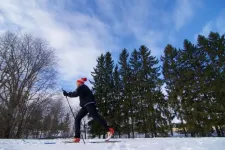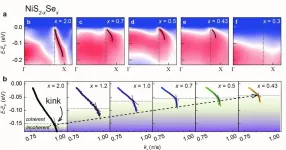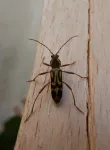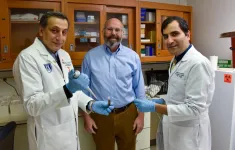First the treats, then the tough stuff: A bacterial dinner plan for degrading algal blooms
Metaproteomics enables new insights into the marine carbon cycle
2021-03-09
(Press-News.org) The annually occurring algal spring blooms play an important role for our climate, as they remove large amounts of carbon dioxide from the atmosphere. However, they are an ephemeral phenomenon. Most of the carbon is released into the water once the algae die. There, bacteria are already waiting to finish them off and consume the algal remains.
Previous studies have shown that in these blooms, different algae can come out on top each year. However, within the bacteria subsequently degrading the algae, the same specialised groups prevail year after year. Apparently not the algae themselves but rather their components - above all chains of sugar molecules, the so-called polysaccharides - determine which bacteria will thrive. However, the details of the bacterial response to the algal feast are still not fully understood.
Metaproteomics: Studying bacterial proteins in bulk
Therefore, Ben Francis together with colleagues from the Max Planck Institute for Marine Microbiology, the University of Greifswald and the MARUM - Center for Marine Environmental Sciences at the University of Bremen now took a closer look at the bacterial insides. "We decided to center on a method called metaproteomics, which involves studying all proteins in a microbial community, in our case in the seawater", Francis explains. "In particular, we looked at transporter proteins, whose activity is critical in understanding the uptake of algal sugars into bacterial cells." In the metaproteomic data, the scientists saw that these transporter proteins distinctly changed over time. "We saw a pronounced shift in the abundance of transporter proteins predicted to be involved in uptake of different types of polysaccharide", Francis continues. "This indicates that the bacteria start off by mostly focusing on the 'easy to degrade' substrates, such as laminarin and starch. Then later on they move on and attack the 'harder to degrade' polymers composed of mannose and xylose."
One sugar after the other
In other words, the bacteria take the easy road first, and only when the treats have been consumed, they aim for the chewy bits. When does this shift happen? Ben Francis and his colleagues see two possible triggers: It could either take place when competition for the easy food sources gets more intense, because the bacteria reproduce quickly in this lush environment and thus cell numbers increase. Or, alternatively, it depends more on the algae: Once the algal bloom breaks down and more algae have died, more of the hard substrates accumulate and they become a viable food source at that point.
Even though the scientists from Bremen and Greifswald have studied the dynamics of algal and bacterial blooms in the North Sea for a long time, this temporal course was something that had so far gone undetected. "Combining state-of-the-art proteomics techniques with sample preparation methods, which specifically consider the high complexity of these very challenging samples, enabled us to establish one of the most comprehensive proteome data set with more than 20 000 protein groups. These data revealed that substrate specificities of transporter proteins change over time. These changes were not visible in the corresponding metagenomic data set used to investigate bacterial diversity", says Dörte Becher from the University of Greifswald. "It clearly shows that we need to dig very deep to understand the underlying ecological processes that govern marine carbon cycling." Quantifying transporter proteins could indeed become an important piece in solving the highly complex puzzle of marine carbon cycling.
Combination of methods allows new insights
"This detailed 'meta-proteogenomic' study combines the exceptional expertise of the University of Greifswald in the identification and quantification of proteins in complex environmental samples with our expertise in molecular microbial ecology", says Rudolf Amann, co-author on the study and director of the Max Planck Institute for Marine Microbiology in Bremen. "Our results indicate that the complex heterotrophic microbiome of the North Sea reacts to phytoplankton blooms not only in substrate-driven successions of recurrent bacterial species, but also in distinct changes of the expression of transporter proteins and degradative enzymes." Ultimately, it will be the combination of various methods that will advance our knowledge of the molecules, enzymatic reactions, and rates underlying the marine carbon cycle, which is a prerequisite for predicting and managing atmospheric carbon dioxide levels.
INFORMATION:
Look behind the scenes in the corresponding blogpost by Ben Francis:
https://naturemicrobiologycommunity.nature.com/posts/metagenomes-tell-us-the-what-metaproteomes-tell-us-the-how-much
[Attachments] See images for this press release:
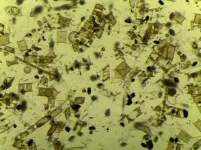
ELSE PRESS RELEASES FROM THIS DATE:
2021-03-09
According to an international study published in Frontiers in Psychology, people around the world have reported changes in their physical activity levels, wellbeing, and eating habits during the first stages of the COVID-19 pandemic. A decrease in physical activity during the pandemic was associated with poorer perceived physical and mental health. Reduced exercise was also associated with perceptions of weight gain and decreased sleep.
More than a thousand individuals from several countries with different containment measures participated in an online survey that explored changes in physical activity, eating, sleep, physical and mental health, and wellbeing during the first lockdown phases ...
2021-03-09
A RAND Corporation report funded by The Rockefeller Foundation shows that COVID-19 testing can be effectively integrated into K-12 schools' pandemic response plans, helping families and staff feel more comfortable with in-person instruction.
The report found that even for well-resourced districts and schools, launching a COVID-19 testing program was a major undertaking that required access to rapid-turnaround tests, additional staffing or strong partners for logistical support, technical assistance for the design and execution of testing programs, and a strategy for successfully engaging the school community to participate ...
2021-03-09
Adding a simple polymer to fertilizers or pesticides could dramatically reduce agricultural pollution, suggests a new study by researchers at the University of British Columbia.
When agrochemicals are sprayed onto crops, a large amount typically ends up in the surrounding environment due to droplets splashing, rebounding or rolling off the target plants.
This amount could be cut at least in half by mixing fertilizers and pesticides with a small quantity of polyethylene oxide, a common polymer additive that improves the ability of agrochemical solutions to stick to plant surfaces, ...
2021-03-09
CORVALLIS, Ore. - A quarter-century-old harvesting restriction intended to last one year has served as an obstacle to returning eastern Oregon national forests to the healthier, more fire-resilient conditions they embodied in the late 1800s, research by the Oregon State University College of Forestry shows.
The findings, published in Ecosphere, are both important and timely because the U.S. Forest Service recently revised what has widely become known as the "21-inch rule" - a prohibition against cutting trees greater than 21 inches in diameter at breast height on Forest Service land in eastern Oregon.
"Under the old policy, live trees more than 21 inches in diameter ...
2021-03-09
Strongly correlated systems are materials that exhibit strong interactions between electrons, a property unseen in ordinary conductors or insulators. Typical examples include metal-insulator transitions or unconventional high-temperature superconductivity where the resistance becomes zero at high temperatures.
There have been studies to explain this strong interaction between electrons and their characteristic energy scales, but no direct observation on such energy scales through theory or experiments has been reported. To this, the POSTECH-IBS joint research team has succeeded in directly observing the evolution of coherence energy ...
2021-03-09
WASHINGTON--Illegal use of anabolic steroids not only has dangerous side effects during use but also can harm of men's testicular function years after they stop abusing steroids, according to a study published in the Endocrine Society's Journal of Clinical Endocrinology & Metabolism.
Anabolic steroids are synthetic forms of testosterone, and their abuse is prevalent among athletes worldwide. Some people use these steroids without a prescription to improve athletic performance or get a more muscular look. Known side effects of these drugs in men include breast growth, hair loss, shrunken testicles and lower testosterone levels. Also called hypogonadism, low testosterone can cause decreased sex drive, poor erections and a low sperm count.
"It is still debated whether illicit ...
2021-03-09
A worryingly high number of Asian bamboo longhorn beetles (Chlorophorus annularis) turn out to have been emerging across Europe for about a century already, finds an international research team, headed by researchers from the Center of Natural History, University of Hamburg, Germany. Curiously, the recent records of the invasive, non-native to the Old Continent species are mostly sourced from citizen scientists and online platforms, which proves the power of involving the public in species monitoring. The study is published in the open-access, peer-reviewed ...
2021-03-09
A two-week course of high doses of CBD helps restore the function of two proteins key to reducing the accumulation of beta-amyloid plaque, a hallmark of Alzheimer's disease, and improves cognition in an experimental model of early onset familial Alzheimer's, investigators report.
The proteins TREM2 and IL-33 are important to the ability of the brain's immune cells to literally consume dead cells and other debris like the beta-amyloid plaque that piles up in patients' brains, and levels of both are decreased in Alzheimer's.
The investigators report ...
2021-03-09
An analysis of SARS-CoV-2 genome diversity in more than 1,000 people in the United Kingdom suggests that if viral mutations do arise, they can be transmitted in some cases but they rarely persist in subsequent transmissions. "Our observations indicate the within-host emergence of vaccine- and therapeutic-escape mutations is likely to be relatively rare," say the authors, "at least during early infection when viral loads are high." However, because mutations that can escape therapies like antibodies were identified, including in higher viral load samples, the authors encourage continued monitoring and vigilance, particularly as vaccines and therapeutics that put "pressure" on viruses to adapt are rolled out more widely. ...
2021-03-09
While receiving just one dose of a two-dose SARS-CoV-2 vaccine tends to decrease infections in the short-term if it produces a strong immune response, it may increase the potential for the virus to "escape" therapies in the longer-term if one-dose vaccinal immunity is weak, reports a new modeling study "[O]ur work emphasizes that the impact of vaccine dosing regimes are strongly dependent on the relative robustness of immunity conferred by a single dose," the authors write. As COVID-19 vaccines have been distributed internationally, several countries including the United Kingdom and Canada have chosen to delay the second dose to increase the number of individuals ...
LAST 30 PRESS RELEASES:
[Press-News.org] First the treats, then the tough stuff: A bacterial dinner plan for degrading algal blooms
Metaproteomics enables new insights into the marine carbon cycle

